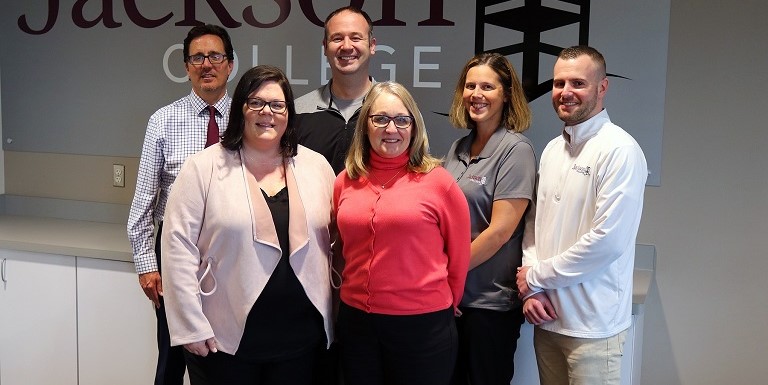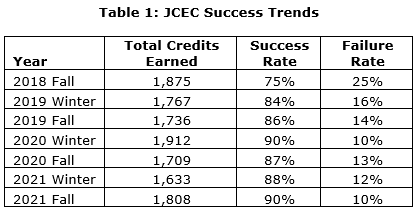Jackson College and Jackson County Early College Partnership: A Pathway to Student Success and Opportunity

In January 2018, 14 local school district superintendents and Jackson College’s (JC) President and CEO, Dr. Daniel J. Phelan, initiated the launch of Jackson County Early College (JCEC), designed to offer students the opportunity to earn a high school diploma and an associate degree, certification, or up to 60 college credits. This article highlights the program’s successes since its first students walked through the doors in fall 2018.
Cost Effectiveness
Since the inception of JCEC, JC has reduced tuition and fees for early college students in a variety of ways. The college capped digital textbook fees at $50 per course and, during the pandemic, removed online course fees; both actions have resulted in significant savings for students and families. The cost of these college courses is also underwritten by the state foundational allowance, which continues to increase, thereby further reducing family costs. JCEC students who qualify for free and reduced lunch continue to receive this benefit as well. The McKinney-Venlo Act covers 100 percent of costs for homeless students attending JCEC. In addition, students who remain for a 13th year have expenses covered by the state foundation allowance, as districts recover the costs from the Michigan Department of Education.
Creativity
This program has established several cross-functional teams to support student success.
The JCEC Administrator, an Intermediate School District employee, has been granted access to JC platforms, allowing access to student records, grades, and long-term educational plans. In addition, the administrator is embedded within JC’s First Year Seminar (FYS) course and collaborates with the FYS instructors, former middle and high school educators, to create curricula and address student needs. The FYS course, which has been required for all JCEC students since 2019, has contributed to improved student achievement (as indicated in Table 1).
Beginning fall 2022, JC Student Success Navigators will have access to local district student information systems, allowing them to create appropriate college and career readiness plans. JCEC has also partnered with the Jackson Area Career Center to allow students to study career and technical education curriculum and transfer to JCEC for final implementation of their career preparedness. This includes working with the Jackson Area Talent Consortium and partnering with the Jackson Area Manufacturing Association. JCEC also collaborates with the Jackson County Whole Child Collaborative, which provides social-emotional support for students.
A steering committee, comprised of the Chief Academic and Student Services Officer, an Associate Dean, and a Registrar from JC; five superintendents; three principals; three district counselors; and the JCEC Administrator, meets monthly to govern the program. A JCEC team, including the Associate Dean and Registrar who sit on the steering committee along with a Dean, Student Success Navigators, representatives from the Finance and Technology departments, and the JCEC Administrator, meet monthly to discuss daily operations. JC Student Success Navigators and the administrator are embedded in the local districts with regularly scheduled weekly hours to provide academic support to students. A Center for Student Success (CSS) tutor has been added to the most at-risk high school for weekly tutoring, and JCEC/JC plans to expand this initiative to other high schools in fall 2022. The navigators and administrator also provide support and professional development to district counselors.
JC created a customized student application process, streamlined to provide equitable access. In addition, parent involvement is significantly important for student success and encouraged for program participation. As common practice, parents are invited to informational meetings, orientation, and student course planning sessions.
Quality
JCEC has seen tremendous growth and success. The program has been approved to grant the coveted Michigan Early Middle College Association certificate to 13-year students who have achieved the required number of college/career-readiness activities and college credits, which is the program’s primary focus. JCEC also prioritizes the identification and recruitment of students from alternative educational settings and underserved populations; more than 50 percent of JCEC students receive free or reduced lunch.
In a survey of JCEC students, 99 percent would recommend this program to other students. A student from Columbia Central High School offered this statement about JCEC:
I am so glad I took advantage of this opportunity. I will have 43 credits when I transfer in the fall, and it saved me a lot of money. The professors were all very helpful and staying at home my first year was also beneficial for me. I could not have asked for a better first year at Jackson College or a better experience in the Early College Program.
A student from Jackson High School said, “This program has been a great resource to help me pursue the dream future I want. . . . I would recommend this program to everyone. It has been an amazing experience.”
Overall Student Success Data
The initial JCEC cohort had 293 students. Since that time, the program has grown to over 400 enrolled students. As of fall 2021, 1,075 students have taken advantage of this unique opportunity. Additionally, the student success rate, defined as a 2.0 or above GPA, has grown each semester, including during the pandemic. (See Table 1.)
Next Steps
In an effort to continue the development and sustainability of this program, we have identified the following strategic items: increased collaboration with local school districts, additional embedded academic support within the school districts, and intentional progress on closing the access equity gap. To further strengthen the collaboration with partnering school districts, JC plans to increase communication with the principals and guidance counselors. This will allow us better access to their student populations and create better transparency with the districts’ participation. Embedding additional support in high school districts as part of the pilot was well received, creating better connections between JC supports and students. Our goal is to eventually embed support staff in all 13 of the partnering school districts.
The original intent of JC’s development of the JCEC program was to provide higher education opportunities to all high school students within our community, regardless of socioeconomic factors. Throughout the first 3.5 years of this program, we have seen steady growth. However, we have not yet achieved our goal of reaching every student demographic that makes up our local communities. JCEC plans to create more access avenues for students in Jackson County, enabling participation in this program by removing barriers that are inhibiting them from accessing a college education. By continuing to make progress toward our internal improvement goals and by maintaining our relationships with district partners, we hope to see continued growth within this program and to maintain the high levels of student success we have seen so far.
The Jackson College and Jackson County Early College partnership is a League for Innovation in the Community College 2021-2022 Innovation of the Year Award winner. See the partnership featured here.
Lead image: Jackson College’s 2021-2022 Innovation of the Year Award-winning team from left to right (Monica Bouman, Jean Logan, Jamie Witt, and Chris Kimball in the front; Jeremy Frew and Zakary McNitt in the back).
Opinions expressed in Innovation Showcase are those of the author(s) and do not necessarily reflect those of the League for Innovation in the Community College.
Zakary McNitt is Registrar; Monica Bouman is Associate Dean, Student Services; and Jean Logan is JCEC Administrator at Jackson College in Jackson, Michigan.











